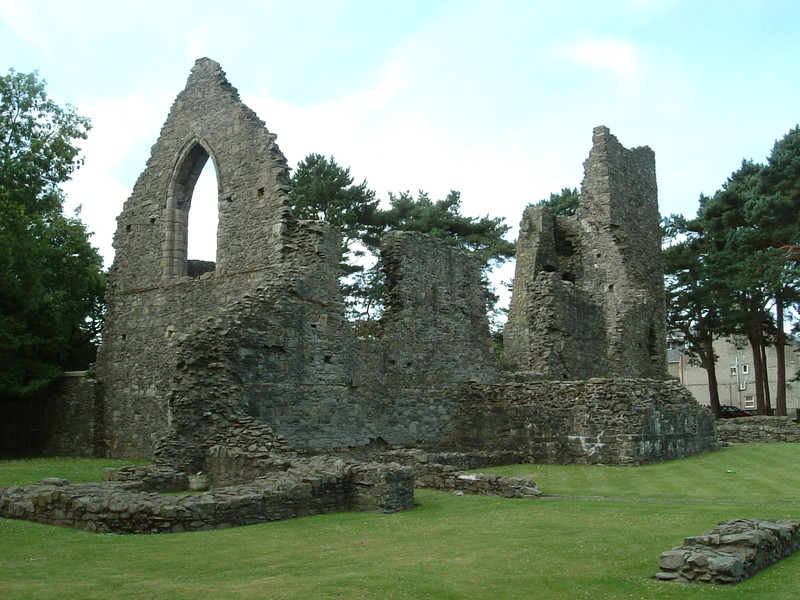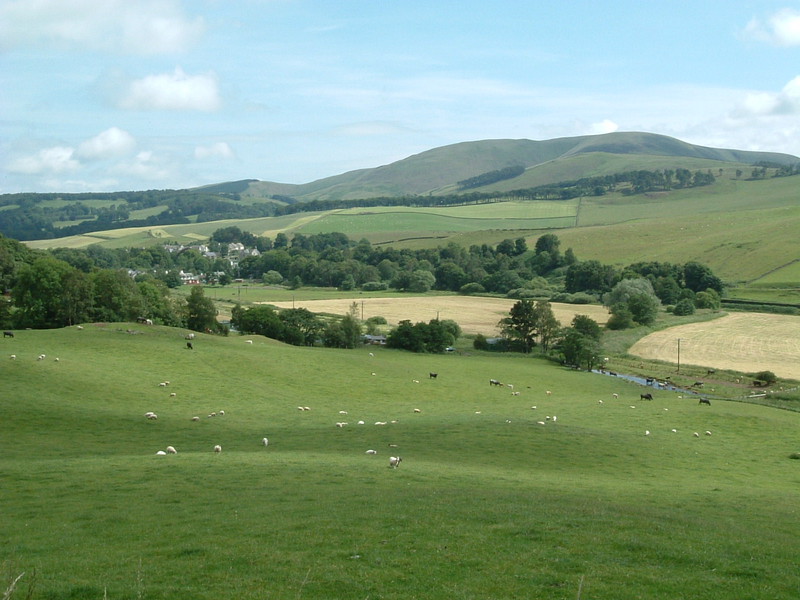
Unfortunately even a relaxing rest day couldn't cushion the shock I received in Peebles. Everything had been going so well; I enjoyed my morning visit to Melrose Abbey, the bus ride to Peebles was quick and easy, and as my B&B wasn't open until 3pm I spent the afternoon sitting by the River Tweed, soaking up the pleasantly chilled-out atmosphere of this delightful border town. It was idyllic, but when it came to check-in time it all went a bit wrong.
'Would you like a cooked breakfast?' my kindly B&B host asked in customary fashion.
'Mmm, yes please,' I said, with the sort of enthusiasm that comes from a vivid imagination and a love of fried bacon.
'You know we're vegetarian?' she asked, and it took a few seconds before I realised she wasn't just making polite conversation. 'Tomorrow we're having fried nut cakes and porridge. Is that all right?'
I'm proud to say I managed to keep the shock from my face as my visions of sizzling bacon and bubbling sausages evaporated in a cloud of nuts and lentils. 'Mmm, that would be fine,' I lied, and made plans to head out as soon as possible to stock up on meat.
The problem is that I'm used to a full, cooked, meat-based breakfast, and if I don't get one I really notice the effect on my stamina. I know it's possible to do this much exercise on vegetables alone because I've been bumping into a lovely vegetarian couple recently called Phil and Wendy, and they're walking the 'four corners', which involves visiting the northernmost, southernmost, easternmost and westernmost points of Britain by foot. They're surviving fine without meat, so my fixation with a proper cooked breakfast isn't entirely justified by my exercise regime, but beans for breakfast just doesn't cut the mustard; I'm desperately hungry by 10 o'clock if I don't get my morning pig out.
Luckily Peebles came to the rescue and I found a pub that served a 16oz T-bone steak with all the trimmings, which I washed down with a couple of pints of Tennent's Velvet, a reasonable smoothflow brew that is vastly improved by the fact that it's served deathly cold. Of course, this being a pub, I ended up getting a well-done steak despite ordering it rare – pubs that serve properly cooked steaks are as rare as vegetarian B&Bs – but at least it prepared me for whatever awaited me in the morning.
Off-trail

Of course it turned out to be a fine breakfast and I happily wolfed it down despite my blinkered meat fixation. The porridge was excellent and contained plenty of slow-burning carbohydrates, and although I wouldn't go out of my way to eat fried nut cakes for brekkie, I can think of far worse ways to start the day. But whatever the qualities of the breakfast, my hosts more than made up for it by being chatty, friendly and not remotely inclined towards tree hugging. I felt a little ashamed at my assumption that the world owed me a meat breakfast every morning, no questions asked; at least they hadn't plastered their B&B with signs telling me that 'No meat means no meat', for which I was thankful.
In fact my breakfast set me up for a cracking day's walk, and not only because the weather was great and the walking easy. Today was the first day for a very long time in which I followed nothing except my own directions; looking back in my schedule, the last day that I struck out cross-country and didn't follow a Way, a Trail or a Link was on 2 June, when I decided to leave the Cotswold Way at Painswick and head west to Gloucester. That's over five weeks ago; since then I've spent most of the time following way-markers and other people's footprints, but I miss striking off on my own and I'm going to keep on missing it, because from Edinburgh to Glasgow I'll be walking along canals, and from Glasgow to Inverness I'll be on the West Highland Way and the Great Glen Way. After Inverness I'll be on my own again, but unfortunately a fair chunk of that walk seems to be along the coastal A-road, which is hardly going to tax my map reading skills.

This kind of walking is made even more interesting by the difference between English and Scottish law. In England and Wales it is the duty of the highway agencies to maintain up-to-date maps of rights of way and to ensure that they are usable and signposted. These rights of way are then shown in green on Ordnance Survey maps and this all conspires to make navigation relatively straightforward; you stick to the green lines and keep an eye open for signposts and way-markers. In Scotland the law is different and there is no legally recognised catalogue of rights of way; this doesn't mean that there aren't any, it's just that they aren't collated by an official body, and instead non-governmental organisations like the Scottish Rights of Way and Access Society end up documenting them, putting up signs, defending access rights and so on. It also means that Ordnance Survey maps for Scotland don't show rights of way, which is a bit of a shock when you first cross the border.
On top of this Scotland has a tradition of allowing the public free access to most of the country, a system that the Land Reform (Scotland) Act of 2003 puts into a legal framework. The upshot is that when you walk through Scotland, you don't have to stick to rights of way as religiously as you do in England and Wales. It's not true to say that you can go anywhere and do anything in Scotland, but as long as you don't damage anything or ignore restrictions imposed during the grouse shooting and deer stalking seasons, a lot of Scotland is there to be explored.

This makes Scottish off-trail walking much more interesting, because you really have to read the map. In England the highland authorities are legally obliged to maintain rights of way, but this isn't the case in Scotland. All the paths I've been on have been kept clear, so somehow the system still ensures quality paths, but where a green dashed line on an English map theoretically means there will be a clear path there, a black dotted line on a Scottish map means that there was a path there when the area was surveyed, but nothing more. It adds a certain sense of mystery to the whole thing; it's quite possible that some of these tracks are never used, and I like that idea.
So today and tomorrow are days to savour; they're days when it's just me, my maps, my compass and a bit of good old-fashioned orienteering. Sure, today's walk wasn't that astounding, but after the last few weeks of steep climbs and hard terrain, I'm thoroughly enjoying the friendly environment of the Borders. From Peebles I stomped around a hill and into the village of Eddleston, from where the path wound north through another man-made forest on top of the Cloich Hills before descending to West Linton, where I tracked down my B&B, found nobody home and retired to the Linton Hotel for a pint of Tennent's 60 Shilling.
The journey wasn't mind-blowing, but so what? I enjoyed myself, I saw a deer in the forest, I lost count of the number of rabbits hopping across the roads, I smiled at drivers and farmers and got hellos and waves back, and I covered the 14 miles without any hitches whatsoever. If that's the effect of having fried nut cakes for breakfast then I might have to rethink my attitude towards black pudding.
At Last

I wouldn't have found the Gordon Arms until tomorrow if I hadn't decided to go for a quick recce before eating. Tomorrow I'm taking a Roman road north into the Pentland Hills and I thought I might as well check out where it starts, just so I don't end up wandering aimlessly around the village in the morning, rubbing the sleep from my eyes with the weight of a full backpack sitting uncomfortably on top of my breakfast. I soon discovered that up by the start of the Roman road sits the Gordon Arms, the first Scottish pub that I've felt compelled to write glowing prose about.
For a start, the Gordon has hand-pulled beer. You might not think this is a big deal, but despite considerable research in Jedburgh, Melrose and Peebles, I failed to find one pub with proper hand pumps. Lager is huge in Scotland, just as it is in England, but the only other option in most pubs is 'heavy', which comes in the form of 60 Shilling, 70 Shilling or 80 Shilling, the name coming from the amount of tax that used to be levied on a barrel of said beer (the higher the number of shillings, the higher the alcohol content). Normally these beers are pressurised out of the keg and are served from on-off taps in the same way as lager, and I don't rate heavy that much; it's acceptable, but it has a strange malty element to it that doesn't quite do it for me. Thankfully it's served cold, which helps to dull the taste, but I'll only drink keg-based heavy when there's no other option.
But there are some great Scottish real ales, and when you find them, they're a treat. While browsing London's off-licences and supermarkets I've often come across Caledonian's Deuchars IPA, mainly because it was voted Champion Beer of Britain for 2002 and 2003 and is therefore easy to find; so when I saw a hand pump with Deuchars IPA on the bar of the Gordon Arms, I knew I'd found my spot for the evening. And what did I have from the menu to accompany the best pint in Scotland so far? To start, I scoffed deep fried black pudding, and I followed it up with a big, fat cheeseburger with all the trimmings.
I think I've made up for the fried nut cakes now. You have to watch your calorie intake carefully in this game...